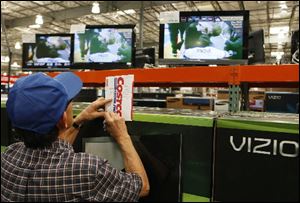
Cool spring for retailers? Data point to slower spending growth with late Easter, costly gas
4/6/2011
A shopper notes television prices at the Costco Wholesale store in Glendale, Calif.
NEW YORK — A late Easter, lingering cold weather and rising gas prices are squeezing discretionary spending this spring, according to data being released Wednesday.
Figures from MasterCard Advisors' SpendingPulse show sales growth slowed in some categories last month. But consumers spent more on clothing — and most other items from electronics to luxury goods — than they did in March 2010.
SpendingPulse tracks spending across all payments including cash.
Growth in online sales, still less than 10 percent of all retail sales, accelerated last month as shoppers tried to save on gas, according to Michael McNamara, vice president of research and analysis for SpendingPulse.
Online spending in all categories rose 16.1 percent, compared with lower rates in January and February and a 15.9 percent increase in March 2010.
"March wasn't too bad; the momentum is continuing," McNamara said. "But gas prices could have a bigger effect (on spending) if they continue to rise."
Separately, selected major retailers are to report Thursday on revenue at their stores open at least a year. Analysts expect merchants collectively to report a decline for March from a year earlier, the first drop since August 2009. The comparison is considered a key indicator of retailers' health.
An important factor in the expected drop is that Easter falls on April 24 this year, so sales won't get a boost from holiday-related spending until this month. Last year, Easter fell on April 4 so shoppers bought holiday goods in March. Analysts say combining March and April figures gives the best read on consumer spending.
Clothing sellers, including J.C. Penney Co. and Kohl's Corp., are expected to have been hit hardest in March by shoppers delaying spending on holiday items. Lingering wintry weather also made short-sleeve shirts and shorts less enticing. Some stores tried to sell both cold-weather items along with spring fashions, says Stifel Nicolaus analyst Richard Jaffe.
"That doesn't create a powerful fashion statement in the stores," Jaffe said.
Ken Perkins, president of the RetailMetrics LLC research firm, agreed that gas prices are "a cloud looming" that could stall the increases in consumer spending that stores saw in January and February.
He said he expects a 0.5 percent drop in revenue at stores open at least a year for March, compared with an 8.7 percent increase in March 2010. For March and April combined, Perkins expects about a 3.5 percent increase, in line with the rate spending has been growing since January. Thomson Reuters predicts a 0.7 percent decline for March.
A gallon of regular gasoline now costs 18.2 cents more than it did a month ago and 85.7 cents more than last April. The national average price was $3.685 on Tuesday, according to AAA, Wright Express and Oil Price Information Service. A separate SpendingPulse report showed that gas purchases at the pump are down for the fifth consecutive week, suggesting shoppers are cutting back on driving.
Many other prices also are on the rise. Food prices are expected to rise 3 percent to 4 percent this year, with the steepest hikes in dairy, meat and coffee. Clothing sellers are raising prices to offset soaring costs for labor in China and for raw materials like cotton.
Consumers surveyed in March for the Conference Board's Consumer Confidence Index voiced concerns about inflation and stagnant incomes. The index fell sharply from a three-year high in February, reversing five straight months of improvement.
On the plus side, job growth gained momentum in March, with companies adding workers at the fastest two-month pace since before the recession began. But low- and middle-income workers' wages may not benefit, and they may be increasingly hard-pressed to keep up with rising costs for basic items.
"The job headlines are great, but does that mean they're going to Kohl's and being able to spend?" Perkins said.
Analysts dissecting Thursday's reports will look for indications from retailers of how gas prices are affecting customers. They'll also be gauging the impact of the triple calamity in Japan — the earthquake, tsunami and nuclear crisis — on business at chains with stores there, such as Costco Wholesale Corp. and Gap Inc.